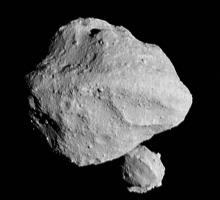Listen to today's episode of StarDate on the web the same day it airs in high-quality streaming audio without any extra ads or announcements. Choose a $8 one-month pass, or listen every day for a year for just $30.
You are here
Allende Meteorite
Some of the oldest rocks on Earth aren’t from Earth at all. Instead, they’re pieces of an asteroid. They formed millions of years before Earth itself — at the dawn of the solar system.
The rocks fell to Earth 50 years ago today. They landed near Pueblito de Allende in Mexico, so they’re known as the Allende meteorites. And they’re some of the most thoroughly studied rocks in history.
The meteorites were part of a larger rock that slammed into Earth’s atmosphere at high speed. It formed a brilliant streak of light that was visible across thousands of square miles of Mexico and the United States. The stress of its flight through the atmosphere caused the rock to explode. Fragments rained across more than a hundred square miles.
Over the decades, scientists and collectors have recovered more than two tons of the meteorites. Most of the pieces are no bigger than a sugar cube. And scientists have studied them in labs across the world.
They found that the Allende meteorites are carbonaceous chondrites. That means they’re dark, and they contain a fair amount of iron. But they also contain veins of white minerals that are rich in calcium, aluminum, and titanium. These minerals were among the first to form in the solar system — 4 billion, 567 million years ago. And they’ve changed very little since their creation. So scientists are learning about the birth of the solar system from some of its earliest residents.






